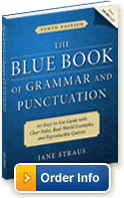|
Hi, Friend.
Welcome to your GrammarBook.com E-Newsletter.

|
"I have learned so much from your grammar lessons. You are fantastic."
- Joseph N.
"As a writer, I've used the E-Newsletter and quizzes to refresh all those lessons I've either forgotten or ignored. It's been a most useful tool."
- Randall K.
"I just found your site, and I think it's great. Ms. Straus's book and site are assuredly already improving the writing of thousands of her fellow like-minded Americans."
- Mary R. |
|
|
Ring vs. Rang vs. Rung
You can tell when to use ring, rang, or rung by whether you need the present, past, or past participle (used with has or have) form.
Present: ring
Example: I always ring the bell after I knock.
Example: He rings twice before entering.
Past: rang
Example: I rang the bell after I knocked.
Example: He rang twice before entering.
Past Participle: has or have rung
Past participles are used with all perfect forms of a verb.
Present Perfect Form
Examples: I have rung the bell.
She has rung the bell.
Past Perfect Form
Examples: I had rung the bell.
She had rung the bell.
Future Perfect Form
Example: I will have rung the bell by noon if the automated system is still malfunctioning.
Conditional Perfect Form
Example: I would have rung the bell if the automated system had still been malfunctioning.
The present participle of ring is ringing. Present participles are used with “to be” verbs.
Examples: I am ringing the bell.
She was ringing the bell.
We will be ringing the bell.
Due to the E-Newsletter's large readership, please submit your English usage questions through GrammarBook.com's "Grammar Blog."
|
|
Pop Quiz
1. He rings/rangs/rungs the bell to get the students’ attention.
2. We ring/rang/rung the bell but no one answered the door.
3. She had ringed/rang/rung the bell three times before I was near enough to hear it.
4. They are ringing/ranging/runging the bell to start trading in the stock market.
Free BONUS Quiz For You!
Friend, because you are a subscriber to the newsletter, you get access to one of the Subscription Members-Only Quizzes. Click here to take a Confusing Words and Homonyms Quiz and get your scores and explanations instantly!

"So convenient...hundreds of quizzes in one click."
Friend, Subscribe to receive hundreds of English usage quizzes not found anywhere else!
- Take the quizzes online or download and copy them.
- Get scored instantly.
- Find explanations for every quiz answer.
- Reproduce the quizzes to your heart's content.
- EASY to use.
- No software to download.
- No setup time.
- A real person to help you if you have any questions!
"Fun to test my skills!" "The explanations really help...thanks!"
Your choice: Subscribe at the $29.95 or $99.95 level ($30 off - regularly $129.95).
"I download the quizzes for my students who don't have computer access."
Subscribe today to receive hundreds of English usage quizzes not found anywhere else!
"Makes learning English FUN!"
 |
Don't need all the quizzes at once?
You can now purchase the same quizzes individually for ONLY 99¢ each. Purchase yours here.
|
|

Get Yours Today!
Get Amazon’s #1 Bestseller in Four Categories!
#1 in Grammar
#1 in Reading
#1 in Lesson Planning
#1 in Vocabulary
|
The Blue Book of Grammar
and Punctuation by Jane Straus
An indispensable tool for busy professionals, teachers, students, homeschool families, editors, writers, and proofreaders.
Now available in print AND as an e-Book! Over 2000 copies are purchased every month!
Order Your Copy Today!
- Hundreds of Grammar, Punctuation, Capitalization, and Usage Rules
- Real-World Examples
- Spelling / Vocabulary / Confusing Words
- Quizzes with Answers
|
View the entire contents online
Discounts available for schools, bookstores, and multiple copies. Order Today!
Wordplay 
If you don't pay your exorcist, you can get repossessed.
With her marriage, she got a new name and a dress.
Show me a piano falling down a mineshaft and I'll show you A-flat miner.
Pop Quiz Answers
1. He rings the bell to get the students’ attention.
2. We rang the bell but no one answered the door.
3. She had rung the bell three times before I was near enough to hear it.
4. They are ringing the bell to start trading in the stock market.
Learn all about who and whom, affect and effect, subjects and verbs, adjectives and adverbs, commas, semicolons, quotation marks, and much more by just sitting back and enjoying these easy-to-follow lessons. Tell your colleagues (and boss), children, teachers, and friends. Click here to watch.
|